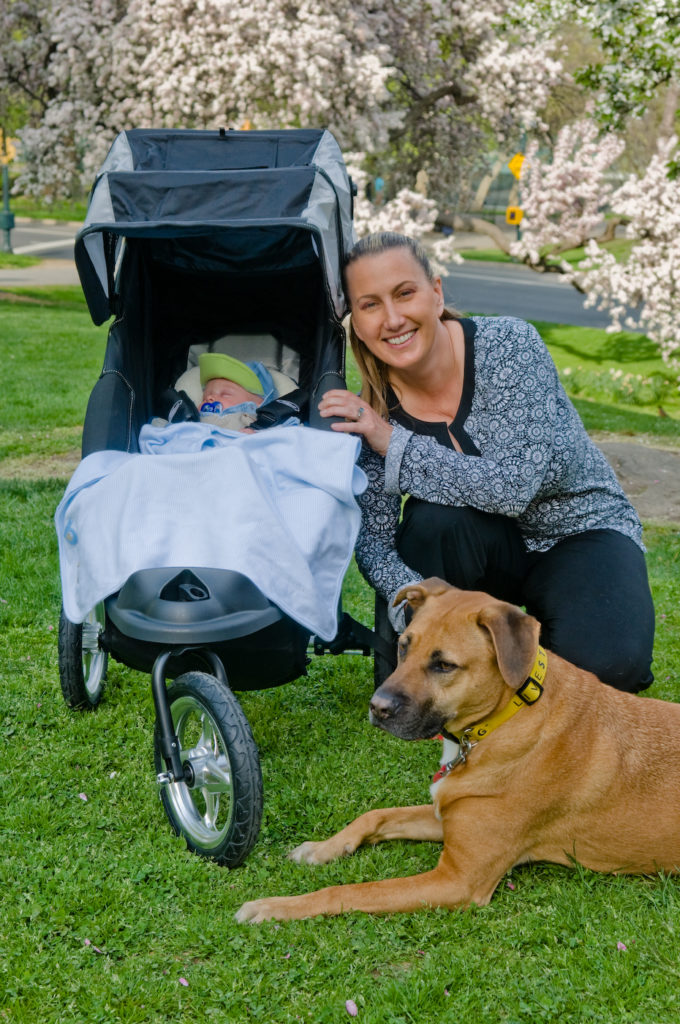
My Life As A Widow: Growing Through Grief and Reclaiming Self
by Dawn Nargi
Norman and I were married in 2004 in Italy surrounded by family and friends who traveled 2,000 miles to celebrate the occasion. The mountains of Ravello, the winding roads along the coast, and the White Cathedral in the square combined to make the Amalfi Coast a magical spot to celebrate our love.
In 2007, my husband and I felt like the luckiest people in the world. We had just purchased our dream home, a two-bedroom apartment on the Upper West Side of Manhattan, and we were expecting our first child in February 2008. As soon as we learned we were going to have a boy, we began to prepare our home to welcome him, and started calling him William Louis in honor of our fathers.
Norman seemed to experience the pregnancy with me; friends joked that Norm and I were so connected that he was carrying a baby with me, experiencing all the joy and sympathy pains as we anticipated William’s arrival. But when I was told on December 19th that I needed an emergency C-section, William Louis was born two months early at 2 pounds 14 ounces. Small, but breathing on his own, he was placed in neonatal intensive care (NICU) for monitoring. That’s when Norman and I began to learn all we could about caring for a premature baby.
William was released from the NICU on January 18th, 2008. My husband and I were thrilled and terrified to bring him home. At four pounds, he looked so tiny in the car seat, fragile and vulnerable. But once we got home and put him in his bassinet, we believed our grand luck was beginning again.
We had everything we had ever wanted.
We introduced William to Canyon, our 7-year-old Ridgeback/Pitbull rescue dog who we had treated as our first child for years. Canyon immediately became William’s big brother and protector. When William cried, Canyon came to get us — and William cried a lot when he came home. Accustomed to the bright lights, continued beeping, and scrupulous care of the NICU, William did not take well to any slight change in his routine. We made many calls to the nurse hotline those first few weeks.
As William became more comfortable in his surroundings, I realized Norman’s sympathy pains had continued despite giving birth. With the help of Norman’s sister, Penny, I forced him to visit a gastrointestinal doctor. On January 25th, when William was 1-month old, we learned that Norman had tumors in his liver, kidney, and spleen. Further testing revealed it was cancer. Norman immediately began a regime of chemotherapy, drug treatment, and radiation.
I found myself shuttling back and forth between Sloan Kettering where Norman received chemotherapy, and home where I continued William’s regimented NICO schedule of nursing every three hours, plus maintaining Canyon’s daily walk schedule. While nursing William and walking Canyon, I listened to Lance Armstrong’s book, It’s Not About the Bike, which helped me gain insight on how to win the fight against cancer. As a team, we signed up with Livestrong and proudly wore our bright yellow bracelets determined to stand strong and win this battle. Even the baby had the tiniest t-shirt and Canyon had a bright yellow Livestrong collar.
The doctors were encouraging and predicted that Norman would live for 15 more years. I was certain that if we followed the doctors’ orders and refused to give up, with our luck and love we would beat this disease. We began to believe we were recovering from a second tragedy during our marriage and look upon this time of our life as something that made us stronger. But by March, Norman began to get weaker. First, he needed to lean on me to help him walk, then he used a cane, and finally the nurse pleaded with me to accept a wheelchair to bring him back and forth to Sloan Kettering. She explained that he needed it to help him get better. I reluctantly complied, despite beleiveing that if I pushed harder and harder and ignored the signs of deterioration that we would win.
I ignored Canyon’s signs when he smelled Norman and scurried away to the corner whining. I told Norman he was crazy when he noticed Canyon’s behavior because I wasn’t ready to give up. At our next visit, we learned what Canyon smelled: The chemotherapy and drug treatments were not working. Norman began to deteriorate more rapidly, and my moods shifted from blind optimism to fear to guarding Norman as best I could. I refused to sign the DNR even though I knew it was what Norman wanted. I thought that by sheer will I could eradicate the cancer — but, I couldn’t. On March 25th, 2008, Norman and I lost our battle with cancer.
I was a new mom who had become a new widow.
In those early days I felt utterly detached, filled with deep sadness and disbelief. I returned to work from my maternity leave in July 2008. I was thankful to be working because it gave me a routine and a time to think about something other than my situation, but as I walked to the subway every morning, I felt separated from the world. No one, I imagined, could understood the depth of my pain. Life felt impossible to manage — emotionally, physically, and financially. I was spent.
The first challenge to face was hearing the baby’s cries at night. I had lost my hearing in my 20s; unable to wear my hearing aids while sleeping, I could not hear the William’s cries at night. Just as Canyon understood Norman’s illness, he now understood my need for help and was happy to expand his big brother role by jumping on the bed and licking my face to wake me every time William cried.
The second challenge was finding parts of my former self. Prior to Norman’s death, I was physically fit, loving the outdoors, exercising and meditating every night before going to bed. But when I tried to meditate now, I quickly fell asleep, exhausted from the day. Also, I couldn’t jog or bike without a partner to care for William. The path back to my old self seemed insurmountable, but I started by putting one foot in front of the other, mentally and physically. I began walking every morning in New York City’s Central Park, my oasis in the middle of the city. The baby was small enough to be carried in a Baby Bjorn, and Canyon was well trained and could walk off leash beside us. I was in the present moment here, fully immersed in the beauty of the water and trees contrasted against the back drop of big buildings reaching for the sky. I mindfully walked myself back amongst the living.
The more I began to put the pieces back together, the more I realized the long road ahead of me. It finally dawned on me that it took years to build my life with my husband and it would take years to rebuild my life alone. I began to seek support from widows, realizing that the best help came from other women who had gone through the same process. They got it that grief is not a disease that you ‘get over’.
Widows understand that emotional sadness is a large part of the loss of a spouse.
They also understand that the complicated jumble of decisions and changes needed to create a new normal can take years.
In 2009 — 1 year after the death of my husband — a friend (and widow) and I started The W Connection, Widows Helping Widows Rebuild Their Lives. As The W Connection grew from one chapter on the UWS to two chapters in NYC and Philadelphia, I began to realize the power of this community as well as the need for this community. Today, The W Connection is a national organization with nine local chapters in the United States, and more to come. I am now the Executive Director and I facilitate our local UWS Chapter in NYC.
Even after nine years, I still find the meetings a powerful way to learn how to navigate my own journey. I keep moving forward, and I keep striving to live a meaningful and mindful life.
###
The W Connection has helped thousands of widows rebuild their lives by getting them connected, encouraged and giving them the tools they need to become empowered to live a full life again. Learn more at widowsconnection.org/
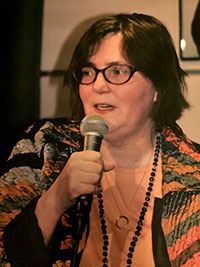
How Self-Expression Saved Me
by Alison Pena
My husband was diagnosed with Stage 4 pancreatic cancer in October 2015. We were together 25 years. There were places we were entwined so deeply, neither of us knew where one began and the other ended. We decided we would live every day like it was the last day of our lives because we knew, for one of us, that soon it would be.
I am a freelance consultant and David was a professional artist from age 11. He finished his last watercolor commission two days before he died and I sang three solo songs in two cabaret shows, two shows each. This had been on my bucket list for ten years and I always had an excuse. Facing death with someone you love rearranges priorities quickly.
The songs I chose were to remind me that I was not just a caregiver and later, not just a widow. In the first show, I sang “I Am Woman”, “I Never Do Anything Twice”, and “Dance Me to the End of Love”, which one brother read at our wedding and the other read at his memorial service. In the second show, which occurred the week he died, I sang “I Will Survive”, “Everybody Says Don’t” and “The Secret of Happiness”.
Singing in the midst of this experience was not easy but always healing, even if I cried. I know of nothing that moves grief through the body like self-expression: words, song and art. After David died, I was in a wasteland of what seemed like endless waves of grief. I began singing at an open mic on Mondays and connected with a community of other singers. They hugged me, encouraged me and gave me a loving community when I felt very isolated and alone.
In addition, I was frustrated by all the assumptions people made about me as a widow and how many people treated me as if I was broken. I was lucky enough to have strong networks of support but even those who loved me did not always know what to say or do. I started writing prose and poetry to get all the experiences and feelings out on paper. I set up a website called BadWidow.comand began sharing my stories, insights, advice and poetry publicly. And widows like me from around the world answered and started sharing theirs. And I was not alone.
Moving through the grief, fear and anger since David died has been a series of baby steps. As a consultant, it took a while before I could court clients again so my biggest connection to other people and myself was with words and song. Self-expression saved me and became an essential part of my self-care. Any kind of creativity can do that for a widow because it took me out of my head into my heart, and my heart is where the healing was and is most needed.
Below are two original poems about our beginning and our ending. As my life continues, I keep writing and singing out loud. Enjoy! I encourage you to find your own voice, whatever it may be.
When Love Showed Up
You met him on a retreat, his first and only one,
laughing, talking on a Delaware Water Gap
dock with two brothers catching eel
for their beloved grandmother’s breakfast.
He held the caught eel which wriggled,
squirming his hand up almost to its mouth,
to bite, dropped it with a jerk, suddenly,
enchantingly in wonder, unromantic,
You talked with him all night, kissing,
at 5 am, you suggested sleep.
“Or,” he said, “we could lie on the dock
and watch the sun rise.” And you knew.
Like a bell ringing, love.
The Day My Heart Broke
October 12, 2015, CT results in.
Pancreatic cancer, Stage 4, terminal,
prepare to die, estimated lifespan,
now measured in weeks, unexpectedly.
“I do” and “till death do us part”,
now with unanticipated meaning,
more than words, now deeds,
to choose or to refuse.
Husband mine, beloved,
Fiercely devouring our last days
together, no old age for us,
holding hands on the porch.
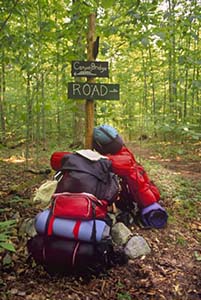
Hiking: Then and Now
By Hali Layton – Member, W Connection Nassau County Chapter
My son was ten and my daughter four when we hiked the mile and a half trail to Manoa Falls on Oahu. As a young family we would take trips that always included hiking. As the children grew, we were able to increase the distance and difficulty of our chosen destinations. We navigated trails in Acadia National Park in Maine, Yellowstone National Park and Grand Tetons National Park in Wyoming, and Glacier National Park in Montana. We hiked through Bryce Canyon National Park and Zion National Park in Utah, Grand Canyon National Park in Arizona and Banff and Lake Louise in Alberta, Canada. I loved to hike and having my family with me was sheer joy.
While my husband Eric enjoyed hiking, his passion was on the water, where we spent most of our summer weekends sailing on the Long Island Sound. As our children became proficient sailors they began to compete in weekly regattas. Now our summers were filled with road trips trailering small boats to coastal towns along the Long Island and Connecticut shore. The hiking boots were tucked away.
The years passed quickly, and soon our children were out and on their own. It was to be our time, my husband’s and mine. We talked about plans and great adventures to be. But so suddenly a nagging cough became a frightening diagnosis. And before we knew what had hit, a year of chemotherapy, radiation and surgery still yielded a death sentence and an end to our 37 year marriage…and all those plans.
I spent the first year after Eric’s death traveling from one family member to another, and was never home for more than a few weeks at a time. Then I found, as the first year had passed, I was feeling a little stronger and ready to venture out a bit more on my own. A friend had told me about a local hiking group she belonged to and invited me to participate on an easy hike. An activity that I enjoyed, but had not experienced in many years, sounded like just the thing I needed to try in this new phase of life. The people I met had discovered how to partake in something that they loved in the company of others, and I found the warm camaraderie infectious. I signed up to join the club immediately that day.
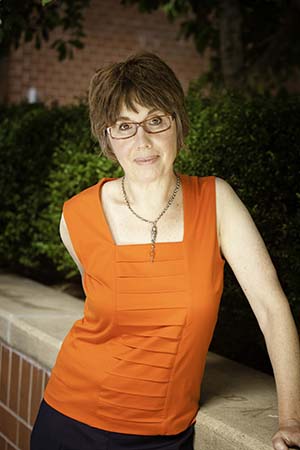
Get Inspired By One of Our NYC Upper West Side Chapter Members: Meet Jo Turpin
Sadly, my story begins like so many others. At the age of 51, my husband of close to 22 years discovered, quite by accident, that he had late stage pancreatic cancer. The diagnosis came as quite a shock as did his death, which occurred a short 31 days later. In the whirlwind of hospitals, doctors and a funeral, I was left contemplating a future I could not imagine. Being a parent to my then teenaged son was close to impossible. Work, which had occupied so much of my imagination, left me disinterested. Because I was self-employed, I was reliant on the recommendations from current clients. But I found it impossible to meet new clients and pitch my services. Because many of my clients knew my husband, it made it awkward. They did not know what to say to offer comfort and unfortunately, I was not very helpful in that regard. My home felt empty and lonely. My surroundings, once my pride, only filled me with apathy. Moving seemed like a solution but I quickly realized my problems lay within. Moving would offer no panacea. It was time to think differently.
My rebirth began with an application to Columbia University to their master’s degree program. It had been a long time since I last attended college but the thought seemed intriguing. Social work appeared to be a good fit. When I received my acceptance letter a few months later, I leapt at the opportunity. The first year was rough; it took some time before I was again comfortable with the structure of the classroom and homework. But over time, I began to relax. When I received my first A for a paper in my human behavior class, I beamed with pride. My son and parents became my biggest cheerleaders. However, halfway through my schooling, I was diagnosed with cancer. I lessened my class schedule and remained in school over the course of my treatment. It took me four years to finally obtain my degree but I graduated in 2014, with a job working for my former economics professor. I work in research as a Staff Associate, on issues of nonresident fathers and child wellbeing. I love what I do even though often, my work is all consuming and I frequently work late hours and weekends. But I still have time left for more amusing activities.
Though I put dating on hold until after I finished school, I recently entered the frightening world of online dating. And I met someone. It is still early but the possibilities seem endless. As I told him just this week, “I never imagined I could be so happy.” The road forward is never easy. I’m learning that it presents unique opportunities. But we have to open our eyes to see them, and learn to embrace the life we are given. For me, it is not the life I imagined or the one I had chosen, but the journey towards recovery has been well worth the effort.
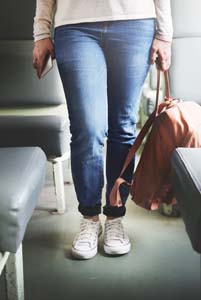
TRAVELLING ALONE
By Andrea Vollmerhausen – Northern California – East Bay Co-Leader Black Diamond Travel Consultant
My husband and I would dream about all the places we would visit once he retired. We had even planned on buying a home in Tuscany so we could just soak up the atmosphere. My husband, John, died in 2007 and I was left with a choice to fulfill our dreams and continue to travel or tuck my luggage in that back of a closet and never travel again.
As I began my journey of rebuilding my life, I realized that travel was a love that I shared with my husband and a passion that I still had even though John had died. While my husband was alive, I had travelled on my own.But I always had an anchor back at home, waiting for me to return. This emotional connection allowed me to see the world but still feel connected to my husband at home. When he died I lost that emotional anchor. No longer was the thought of traveling, alone or with friends, so appealing.
Fortunately for me, I have a group of “traveling buddies” who encouraged me to continue my travels. It hasn’t been easy. Sometimes I would rather stay in bed and just dream of the places my husband and I visited. But the longer I am a widow the more I realize that he would not want me to sit home and live vicariously through others. He would want me to continue to live again.
But how to feel comfortable planning and competing a trip on my own? Obviously as an agent I plan trips for others all the time. But for me, the idea of doing this for myself was a little bit scary. I started traveling again by taking baby steps. A group of fellow travel agents were going to Hawaii and invited me along. Ok, I can do this… Then another group had a cruise scheduled to Mexico. Again, I can do this… And so it went for a few years. Never traveling by myself, or for myself. And then, last year, in my seventh year of widowhood I began to feel this compulsion to take a trip by myself. Maybe to prove something to myself? Whoa, where did this come from? But the opportunity to attend an English immersion program in Germany presented itself and I found that I wanted to go. By myself! Although I would be with many others during the actual program, I would have to fly to Germany by myself and stay in Frankfurt for 3 days prior to the program. I was a bit nervous. But, you know what? I did it and I felt proud of my achievements! I found I actually enjoyed being by myself, with no other people to provide for or to entertain. I’m sure I will do it again, sometime in the near future.
At The W Connection, we say, “we did not choose to be widows, but we can choose how we want to live the rest of our lives”. I chose to see the world again. But this is just my story. Not everyone has a group of friends that encourage traveling. What to do if you have few friends who want to travel?
The W Connection is about getting connected and empowered. What better way to ease yourself into the world of travel than by traveling with others who share your experiences and pain. The W Connection is on the verge of creating trips for W Connection members. For more information and to let us know where you dream of travelling, please email andrea@wconnection.org.
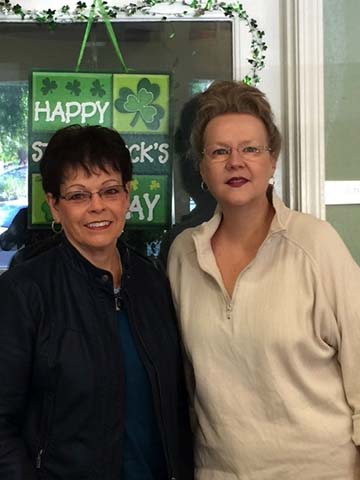
Northern California – East Bay Chapter Leaders
Teresa Boatwright & Andrea Vollmerhausen
We, at The W Connection, are very excited to announce our first West Coast Chapter. We are even happier to introduce you to two women that will bring their leadership, empathy, understanding and life experience to support widows in the Bay area. Meet Teresa Boatwright and Andrea Vollmerhausen.
Teresa’s husband, Daniel died April 27, 2012. Teresa and Daniel were married for 19 years. In the early days, Teresa’s greatest comfort came from her faith, and her family. She spent a good deal of time outside observing the sky, the trees and the stars…..and she cried..alot. In the second year, she rescued a little dog and named him Marlo. Marlo helped her to open her heart once again. Teresa also began to think about what to do next..
In her own words, Teresa said, “It was a progression of events that led her to The W Connection. I heard about the W Connection through one of my sisters, who was witnessing first-hand how heartbroken I was. She suggested I look at the website, which I did, and I just loved the concept of widows helping widows rebuild their lives. “I’m not sure there is another comparable organization to The W Connection. It made sense to me. I shot off an email saying I would be interested in starting a west coast chapter, and, as they say, the rest is history. I spoke with the founder, Ellen Kamp, and liked her mix of warmth and professionalism. I instinctively felt that The W Connection was a good fit for my personality, and the feeling has been confirmed as I discover more about The W Connection. I’m finding it to be a well-organized and thoughtfully executed organization. I walked away from the chapter meetings and those amazing women feeling energized. I can still see all the faces in my mind. It was something along the line of “OK, these women really understand my own complicated feelings” along with the comforting thought that none of the hardships I have experienced is unique. There’s such power in sisterhood! I take courage from the women who have walked this path before me, and I want to encourage the women who are walking this path behind me.”
Andrea, Teresa’s partner in the Bay Area Chapter, was widowed eight years ago, when her husband John, an oncologists, lost his battle with lung cancer. During the first fuzzy year after the loss, Andrea found her greatest comfort was with people in the same situation. Andrea also realized that after being married for 39 years, half of herself was missing.
Andrea’s words resonate with many of us “I had always been somebody’s daughter, somebody’s wife, or somebody’s mother. But never just “Somebody” and I needed to find that person.” When Andre met Teresa, things clicked and they both realized that they were part of a growing group of women that society almost ignores and they both felt the need to help in some way. Andrea immediately felt a connection with Teresa and with The W Connection. Andrea said “Once I spent time with the women from The W Connection I felt like I was coming home to family. We are all so different, our stories are different, our lives are different, but we all have some much in common. I think that by being part of this will help me find my “lost self” and will give me some direction to move my life.”
We are delighted to welcome Teresa and Andrea to The W Connection team to bring our mission and Vision to the West Coast.
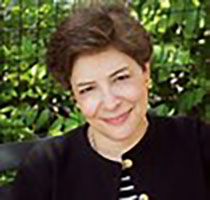
What to Do With Your Late Husband’s Clothes?
By Jacquelyn Ottman, W Connection Member Upper West Side, NY Chapter
Sooner or later every widow has to grapple with the task of figuring out what to do with her late husband’s clothes and other personal articles.This seemingly practical task can become emotionally wrenching; one article after another enshrouded in the memories of our spouse. Clothes are evidence of your husband’s distinctive tastes, they even likely still smell of his distinctive smell, balled up tissues, some coins, a business card or receipt still lodged in the pockets. Clothes represent your husband’s most personal possessions and they can become a personification of your husband himself.
Every widow will likely approach this task differently. Some widows, like Kim, a friend of mine, who commandered her mother and sister to remove her 45-year old husband Jon’s clothes within days of his unexpected death of a heart attack, want the clothes removed as soon as possible. For others, keeping a husband’s clothes around may be comforting. In those very early surreal months after your spouse’s death, you might even have felt like I did, that you should keep his clothes around should he ever ‘come back’ and what would he say upon learning that you gave away his favorite things?
But as we know, at some point logic seeps in, and you realize that the clothes should go. How to dispose of your husband’s possessions with respect for the value they represent? How to deal with this seemingly very sad, potentially heart wrenching task? I believe, while encompassing the practical challenges associated with moving on, getting rid of your husband’s clothes can actually be turned into something positive, even joyful. With enlightened strategies, they can become an additional way to make sure your husband’s memory lives on.
I was intent on making sure that my husbands Geoff’s clothing ‘s wound up in the hands of someone who would appreciate them. I saw this as a way to help Geoff’s memory continue to live on. I feel like I achieved the goal, and it’s so much a source of support for me, I’d like to pass along some ideas for you. Here’s what I did.
The first thing I did was to offer Geoff’s clothes to his children and their spouses. I turned the occasion into something positive, inviting all three of the kids over for lunch and letting them choose what they would like. Geoff’s Columbia University tie was a natural fit for Brett, a recent grad of the Business School. And both of his sons enjoyed taking their pick of his other nice ties. (And it gave me pleasure to help them sift through and find the ‘good ones’. After all, I was intimate with the collection, being the morning tie-picker in the family.) The few pieces of fine jewelry were especially coveted by the boys; they had to decide who got the nice watch and who got the gold cuff links, both presents from me. I was pleased to see his sons get such a nice memento to remember their father by.
When his kids had taken what they wanted, I then offered items to (mostly younger) men who were particularly helpful to both of us, or to me especially in the days and months after Geoff passed away. I loved knowing that my handyman, a sweet man from Staten Island who always cheerfully helped us with all sorts of chores, would enjoy some of Geoff’s polo type shirts, even some pajamas; he might not afford such clothing otherwise. Young men in my office in college or grad school particularly welcomed nice suits for interviews. Still other suits were donated to Career Gear, the charitable organization that helps destitute men dress for job interviews. It was a place that held a special place in Geoff’s heart.
Don’t feel that you have to dispose of your husband’s clothing all at once, or completely. You may find a midway point, getting rid of some things when you’re first ready, and keeping others for various reasons. Seven years later, some of my husband’s most emotionally charged possessions remain in ‘his’ closet. I’m waiting for the ‘right time’ to move them along. Even though logic suggests otherwise, and other deserving men might relish the thought of owning them, I still have the suit Geoff wore to our wedding and I chose to keep old knee socks, flannel shirts, and a knitted vest, all of which I wear myself, feeling good that in a way, Geoff is still is keeping me me warm in the winter.
My own style reflected my and my husband’s own values. We are both environmentalists, so possessions should be put to their ‘highest and best use’. I chose my way. There’s no right or wrong way. Choose the way that makes you most comfortable. Remember to honor yourself in this process. Don’t rush, enlist help if you need it, and try to find a way to honor him in the process by giving to charitable organizations.
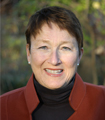
Five Years Later: Looking Back/Looking Forward
By Ellen Kamp
November 26, 2006…the day my husband suddenly unexpectedly died from a massive heart attack.
The fifth anniversary is quickly approaching. It is incredibly hard to believe, since it feels like it happened yesterday. When you think of it as Five years following a 35 year relationship is a blip on the screen. Eric and I were married in our early 20’s so one could say “we grew up” together. Lots of memories…most good, yet some bad. We loved, fought, laughed, cried, worked, and played. So yes, it feels like it all happened yesterday. But then again, there are times when it feels like it happened a lifetime ago.
Of all the “milestone days” – birthdays, holidays, wedding anniversaries – this day is the hardest. For weeks before it approaches I become quite sad and very reflective. In earlier years my reflection brought on a huge amount of tears which kept me totally immersed in the past. This year there are fewer tears and more thinking about the present and future. I am learning that is all part of the healing process. I feel like an important mind shift has taken place – or probably has been slowly taking place for a while -opening me up to think about things that I was unable, or unwilling, to think about these past 5 years.
As I look back, here are some of the things I have learned along the way:
I didn’t grieve correctly or incorrectly –I just did it. There is no playbook for grieving or for being a widow so I did it my way – the best I could. I had to learn not to be too hard on myself. Being the perfect widow is not an admirable goal.
I have accomplished things that I never expected. Some of them seemingly small to some but huge to me – hosting a dinner party alone, driving into the city, training a new puppy. Other accomplishments feel much larger – leaving Corporate America after 35 years and building The W Connection. Most of the widows I have met are amazing women. Widows take on a life that was built for two and live it alone. We accomplish some amazing things and give ourselves little or no credit. Why? Because these accomplishments come from a sad place. Most frequently it is not because we chose to do these things, rather we We did them because we had to. We, as widows, need to get in touch with our own strength and acknowledge it. We need to pat ourselves on the back and pat the backs of other widows.
I must move forward- since I can’t go back. After being widowed my new reality became there is no normal so I must create a “new normal”. When Eric died I lost my entire way of life –he was not only my spouse –he was also my best friend, my partner, my confident?? all the roles? hmmm. I had/have no choice but to rebuild.
My past is part of my future. We don’t “get over” widowhood – we bring it with us. It is with us in the present and will be with us in the future. For quite a while I was afraid I would forget or that I was being disloyal if I made changes to my life. But as with all life experiences, my widowhood is now part of who I am. It is part of my identity. Where I go, it goes.
Rebuilding is not about what we leave behind – it is about what we bring forward. There were many parts of my life with Eric that I loved and that for a long time have felt I can never experience those again because would be too painful: places where we vacationed, restaurants where we dined, hobbies that we shared. Now I ask myself: Do I never want to see Cape Cod or Paris again? Will I never own a dog again? How can I never again eat in restaurants I loved ? Do I ever want to be in a relationship again? I now realize that I need to make choices -what parts of my old life do I want to bring forward to my new life? We had no choice about becoming a widow but we definitely have choices about how we want to live the rest of our lives.
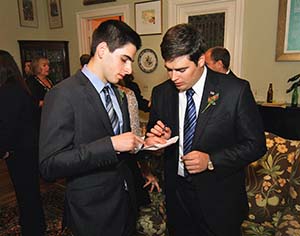
A Son’s Wedding Toast
We are gathered here today to celebrate the marriage of Dave and my mother, Barbara.It is difficult to describe in words the poignancy and significance of this day, but I shall do my best.
It was over five years ago when my mother told me that she had brought a new friend into her life.Having recently lost my father to cancer, I was overcome with the visceral comfort of knowing that my mother was no longer alone.Even before meeting Dave, it came as no surprise that he would become more than a friend.
My first impression of Dave was as an extremely compassionate and consoling gentleman—one whom my mother was so fortunate to have met and who, in his own words, makes her “feel special.”
Knowing that Dave had spent his career serving this country in our Air Force, my second impression of him was that he bears an uncanny resemblance to the pilot who landed his airliner on the Hudson River.
Visiting from rural Illinois, Dave had to acquire the knack for subsiding in this metropolis. His relaxed pace of sauntering along the city sidewalks caused my brother and I to wait up at many street corners. Once, when he was visiting by train from Washington, he took the subway up from Penn Station, then decided to get off at 66th street because it had gotten too crowded. He took a taxi the rest of the way up.
Yet from this teething incident emerges a man with a genuine disposition and a wholehearted, down-to-earth persona—traits that remind me of my Dad.
Dave and my mother are such a perfect match that I expected this moment to arrive long ago. My mother was indecisive about finding a wedding venue—be it a farm, a country inn, or a seaside villa—before finally settling on this room just a few miles from her doorstep.
But I feel so grateful, so blessed, that this moment is now a reality.
Dave:Your integration into the family has enabled us to rise above the dark depths of a tumultuous past. You are truly a father figure and, given the circumstances, are far more influential than I ever would have imagined. You have reinvigorated my life, my brother’s life and, most importantly, my mother’s life.
Mom:I am blown away by how you have been able to continue through the vicissitudes of life with such grace.You were browsing a widow support website in complete despair and, almost as if by magic, have been able to seize that moment and bring yourself back from the trough to where you belong.
As my Dad would say, Carpe Diem.
You have always been willing to go above and beyond to do anything in the world for us, your sons. Now, I am able to celebrate you and Dave.
Here’s to making many more indelible memories; for Barbara and Dave, and for all of us as a family. May the common bond that brought you together make you ever stronger.

Why I Volunteer For The W Connection
By Member Diana Korsh
My motivation to begin to volunteer for The W Connection was the announcement of the Spring 2017 Fundraiser/Gala. I was excited for the opportunity to support the W Connection and their mission to help widows.
When I first decided to volunteer I figured I was going to help out in some small and simple way. However, what was needed at the time was co-chairing the Auction Committee for the Gala. I immediately panicked, thinking I can’t do that. After taking a deep breath, I said “I’m not sure if I can do that, but I can try.” The initial feelings of fear and lack of confidence that many of us widows experience following the death of a spouse, resurfaced, but I realized that it was time for me to do something new, fulfilling, and challenging. With tremendous encouragement and support along the way from the W Connection team, I DID IT!
My first task was to enlist a volunteers for the auction to collect items for the fundraiser and to provide assistance before and during the event. In reaching out to other members, it helped me to connect and get to know different individuals in other ways than from our monthly meetings. I made some new friendships and had some laughs and fun working together. I found that there is always someone who is willing to listen and really understand when in need of a listening ear and perhaps some guidance.
I truly do feel that in a certain aspect the W Connection saved my life, from when I sold my house and moved to the city seven months after my husband’s death at the end of 2015. Volunteering for the W Connection has helped me to move forwards by gaining more confidence and trust in myself in this flying-solo journey.
I encourage other widows to volunteer for the W Connection! You will get to know other members of the W Connection and you will feel good about yourself by helping others.
